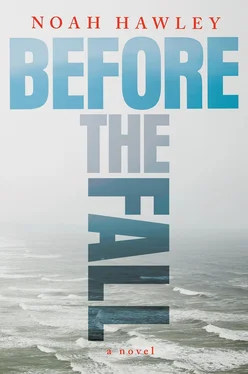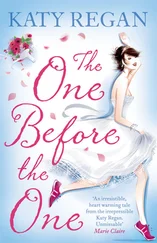And Eleanor listens. Just listens. Sits very still. Doesn’t get upset. Doesn’t seem scared or pissed or — anything. She just listens to him rant and stomp around the bedroom, and then — when he runs out of gas — she tells him she wants a divorce and that he should go sleep on the couch.
Krista comes back smiling. They’re ready for him, she says. Bill is ready, and Doug is so brave for coming in, and the country, the world, is so grateful that there are men like Doug out there who are willing to tell the truth about things, even if it’s hard. And Doug nods. This is him in a nutshell. He is the common man, noble, hardworking. A man who doesn’t complain or demand, but one who expects the world to be square with him. Who expects a day’s work to earn a day’s pay. Expects that the life you build, the family you make, is your life, your family. You earned it and nobody should be able to take that away from you.
A lottery won should stay won.
So he takes off the paper bib and goes to meet his destiny.
* * *
“Doug,” says Bill, “thank you for being here today.”
Doug nods, trying not to look into the camera. Just focus on me , Bill has told him. And this is what he does, focuses on the other man’s eyebrows, the tip of his nose. He’s not handsome, Bill Cunningham, not in the traditional sense, but he has that alpha bravado — the indefinable nexus of power, charisma, and confidence, the unblinking gaze and crotch-forward carriage of a man at the height of his visceral global impact. Is it physical? Pheromonal? An aura? For some reason, Doug thinks of the way a school of reef sharks will scatter when a great white appears. The way some woodland deer will simply surrender to the jaws of the wolf, ceasing their struggles and lying still, subdued by inevitable and irresistible forces.
And then he thinks, Am I the deer?
“These are troubling times,” says Bill. “Don’t you agree?”
Doug blinks.
“Do I agree that the times are troubling?”
“For you. For me. For America. I’m talking about loss and injustice.”
Doug nods. This is the story he wants to tell.
“It’s a tragedy,” he says. “We all know it. The crash and now—”
Bill leans forward. Their feed is being beamed by satellite to nine hundred million possible screens worldwide.
“For people who don’t know the story as well as me,” he says, “give a little background.”
Doug fidgets nervously, then becomes conscious that he’s fidgeting and gives an odd shrug.
“Well, uh, you know about the crash. The plane crash. And how only two people survived. JJ, my nephew. My, uh, wife’s nephew. And this painter, Scott, uh, something, who supposedly swam to shore.”
“Supposedly?”
“No,” says Doug, backpedaling. “I’m just going off something you — I mean, it was heroic — definitely, but that doesn’t—”
Bill shakes his head imperceptibly.
“And so you took him in,” he says, “your nephew.”
“Yes. Of course. I mean, he’s only four. His parents are — dead.”
“Yes,” says Bill. “You took him in ’cause you’re a good man. A man who cares about doing the right thing.”
Doug nods.
“We don’t have much, you know,” says Doug. “We’re — I’m a writer, and Eleanor, my wife, she’s a, like a physical therapist.”
“A caregiver.”
“Right, but, you know, whatever we have is his — he’s family, right? JJ? And look—”
Doug takes a breath, trying to focus on the story he wants to tell.
“—look, I’m not perfect.”
“Who is?” asks Bill. “Plus, you’re — how old are you even?”
“I’m thirty-four.”
“A baby.”
“Not — I mean — I work hard, okay? I’m trying to start a restaurant, to rebuild — while also — and, okay, sometimes I have a few beers.”
“Who doesn’t?” says Bill. “At the end of a long day. In my book that makes a man a patriot.”
“Right, and — look, the guy’s a — hero — Scott — clearly, but — well, he kind of moved in—”
“Scott Burroughs? He moved into your house.”
“Well, he — he showed up a couple of days ago to see the kid, which — again — he saved him, right? So that’s — nobody’s saying he can’t see JJ. But — a man’s home is supposed to be his — and my wife — you know, it’s a lot to handle, with the boy — a lot to process — so maybe she’s just — confused, but—”
Bill bites his lip. Though he doesn’t show the audience at home, he’s losing his patience with Doug, who is clearly a basket case and who — left to his own devices — will implode without communicating the story Bill has brought him here to tell.
“Let me see,” he interrupts, “not to interrupt, but let me see if I can clarify a few things here, because, well, you’re clearly upset.”
Doug stops, nods. Bill turns slightly so he’s speaking into the camera.
“Your wife’s sister and her husband were killed, along with their daughter, under very suspicious circumstances in a private plane crash, leaving their son, JJ, an orphan at four. So you and your wife took him in, out of the goodness of your hearts, and have been trying to give him some kind of family, help him through this terrible time. And then another man — Scott Burroughs — a man rumored to have been romantically involved with your sister-in-law, who was last seen leaving the home of a loose and notoriously single heiress — has moved into your house, while you — meanwhile — have been asked to leave by your wife.”
He turns to Doug.
“You were thrown out,” he says, “to call it what it is. Where did you sleep last night?”
“In my truck,” Doug mumbles.
“What?”
“In my truck. I slept in my truck.”
Bill shakes his head.
“You slept in a truck, while Scott Burroughs slept in your house. With your wife.”
“No. I mean, I don’t know if there’s — that it’s something romantic — I’m not—”
“Son, please. What else would it be? The man saves the boy — allegedly — and your wife takes him in, both of them, as if to make, what? A new family? Who cares that her actual husband is now homeless? Heartbroken.”
Doug nods, the urge to cry suddenly unstoppable. But he pulls himself together.
“Don’t forget about the money,” he says.
Bill nods. Bingo .
“What money?” he says innocently.
Doug wipes his eyes, aware that he is slumped over. He straightens, trying to regain control.
“So — David and Maggie, JJ’s parents — they were — well, you know — he ran this network. That’s not to say anything shady, but — I mean, they were very wealthy people.”
“Worth what? Approximately.”
“Uh, I don’t know that I should—”
“Ten million, fifty?”
Doug hesitates.
“More?” asks Bill.
“Maybe double,” says Doug reluctantly.
“Wow. Okay. A hundred million dollars. And this money—”
Doug rubs his beard a few quick times with his hand, like a man trying to sober up.
“A lot of it goes to charity,” he says, “but then, of course, the rest is JJ’s. In a trust. Which — you know — he’s four, so—”
“You’re saying,” says Bill, “I think you’re saying, that whoever gets the boy, gets the money.”
“That’s, I mean, a coarse way of—”
Bill stares at him with disdain.
“I prefer the word blunt . My point is — and maybe I’m being dumb here — but there are tens of millions of dollars at stake for whoever parents this kid — my godchild, I should add. So — yeah — I’m not — in the spirit of full transparency — I’m not objective here by a long shot. After what he’s been through, the death of his — everybody he loves — that this kid would become a pawn—”
Читать дальше












